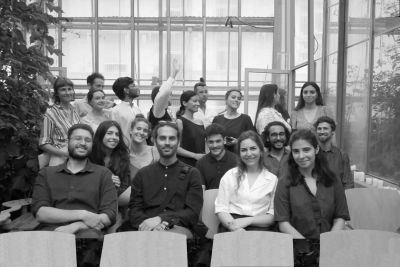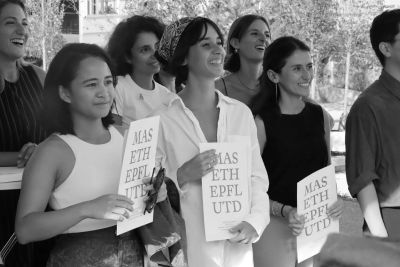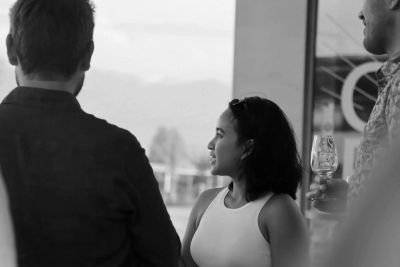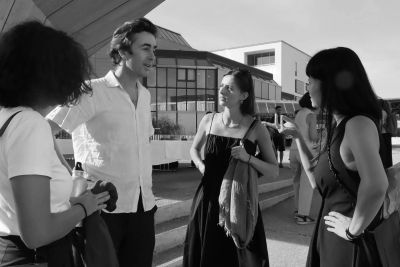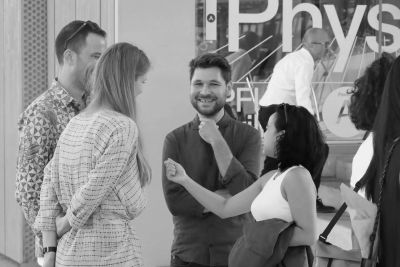Alumni
The MAS UTD started in the Fall of 2021, each year we receive a cohort of up to 24 international participants. The alumni are a vibrant network, many of whom are practising currently in Switzerland and continue to contribute to the programme and activities of the MAS UTD.
Michaela Prunotto
Architect & Urban Designer
The MAS UTD explodes hermetic notions of an architectural education where each sole genius spends sleepless nights perfecting their drawing or model. Instead, it is a dynamic, exuberantly critical environment, where you are interacting with peers, academics, community members, stakeholders and places in the most active and abundant way. There is a socio-ecological imperative which shapes the entirety of this full experience, and I enjoyed that the (curated) timetable portrayed this, with every week holding compelling political trajectories. Project briefs were rigorous and meaningful, setting up a specific, grounded structure from which our thinking could develop. What did I learn? How to engage with context in a multi-scalar, meaningful and engaged way, through fieldwork, workshops, conversations, writing, mapping and model-making. I learned about the power of narrative—visual and textual communication—and how to develop precise terminology to articulate new concepts. Most importantly, I was able to source tools for imaginatively creating (and then relentlessly interrogating) a project rationale, one that springs from real world tensions and actors within a specific place. As architects and urbanists, we need criticality and openness to reorient and transform ourselves, first, to then provoke changemaking in the built environment and industry. The MAS equips us with the capacity and agency to do that. Looking forward, I am grateful that the MAS has opened up new opportunities: a design research residency, academic student assistance, and exciting conversations with my employer. I leave these two lightning fast semesters—magical, dramatic Lausanne and incisive, focused Zurich— with precious memories and a healthy dose of cynical optimism.
Ji Min An,
Architect, AM Architects
It was a difficult decision to take a year off my role as a co-principal of an architectural practice to pursue this full time MAS. But after having completed the year that flew by, I am so glad that I decided to do so. Looking back, I think I was rather skeptical of where the profession was heading; what is the meaning and relevance of our work in relation to the planet in crisis? The course helped me to gain a multidisciplinary understanding of urban and territorial design strategies to be better equipped for a more ecologically just transition. The two semesters were intense but absolutely life changing!
Matteo Bischof
Architect & urbanist
The MAS has proven to be immensely helpful in bridging the gap between architectural planning and urban and territorial design. This condensed yet impactful year has been a motivational journey, encouraging me to explore new approaches to shape our world. The program's emphasis on merging architectural and urban design tools with the territory has not only aligned with my professional goals but has also broadened my mindset, inspiring me to seek innovative ways of living within our environments. I am grateful for the valuable insights and skills gained from the MAS, empowering me to integrate diverse elements into my architectural practice.
Ece Emanetoglu,
Architect & urbanist
MAS UTD introduced me to an alternative way of design-thinking and practicing architecture amidst the urgent call of the environmental crisis. The curriculum stimulated us to redefine architectural terms such as structures, frames, and foundations, to communicate with natural orders, and to understand how ecological systems operate. While at MAS, I developed an interest in mapping tools and visualization techniques on the territorial scale. This interest and course opened the opportunities to collaborate with my peers and professors after graduation, to be displayed in exhibitions, and to connect with academics with similar interests. Currently, I live and work in Basel as an architect, mostly for large-scale buildings and masterplans. In professional life, MAS influenced my thinking/analyzing skills across scales and added the instinct to design with a sense of conscience toward the unbuilt environment.
Michael Fingleton
Architect & Landscape Architect
Researching real and relevant topics, applying scientific methodologies, learning to design processes has given me new and applicable knowledge, and the design tools, to conceive of and deal with large scale projects in real world situations. As a result of the MAS UTD I felt properly skilled to apply to offices of urban and landscape architecture, where I am presently working on reintegrating a site of natural destruction into a modern landscape capable of withstanding future natural events, social change and climate degradation.
Evangelia Kiosse,
Architect & urbanist
Through the programme a critical position was formed for the societal crisis, the depletion of resources and the planetary Climate Change. I found it important that we reconsidered our role as designers, and how we can contribute and offer solutions during this time of transition. Today's problematics raise new questions which bring us to new fields for exploration. This also gave me the chance to see and use the latest technologies we can use to apply these in practice. Having a background in Architecture it took time to make a shift in perception and the way of thinking about the urban fabric. I learned to have a multidisciplinary design approach and the importance of working with different experts in the field. This course broadened my horizons, I wanted to change my field of expertise and apply my knowledge on a scale where with my work I would have a bigger socioenvironmental impact.
Nabila Pranoto,
Sustainable Construction Specialist, Holcim
The course has opened up my mind about the urban designer's role in the built environment. It has opened up a much bigger, multi-disciplinary world that we as architects, designers and urbanists should not ignore, if we want to make real impact on the environment. I picked up a wide range of skills from the MAS, from the technicalities of GIS mapping and video producing to the soft skills of interviewing stakeholders and engaging the local community. The MAS taught me how to read the territory both factually and intuitively, combining data analysis together with the more visceral and creative reading of the spaces that we are studying. I am now a lot more comfortable with jumping across scales, from the small scale of a plant to the massive scale of a landscape typology. I am now working as a Sustainable Construction Specialist at Holcim. This role would never have been in my radar if I had not spent a whole year in this course, getting acquainted with Switzerland and exploring the extensive stakeholders' network in the built environment sector.
Michel Zalis
Doctoral Assistant, Chair for Transitioning Urban Ecosystems,
TU Berlin
One of the most essential personal outcomes from the MAS was developing a social-ecological conscience. This learning is related to a desire for action that the program explores in its design studios, theory classes, workshops, and field works that immerse you in an international environment with spatial practitioners dedicated to a climate transition. During both semesters, the accumulation of drawings, regulatory research, fieldwork, and QGIS mapping was essential to developing representation skills that could describe and transmit ideas related to the socio-ecological features of a complex territorial scheme. Moreover, it was crucial to cross-knowledge with topics such as soil health, air pollution, metabolic systems, water cycles and biodiversity schemes as possible leverage points for systemic design methodologies. I feel glad about my decision to cross the Atlantic Ocean, from Brazil to Switzerland, to do the MAS because this program was fundamental for my professional life. Now, I am starting a position as a Doctoral Assistant in the new Chair for Transitioning Urban Ecosystems (CUE) at TU Berlin, where I will continue researching climate-oriented urban and territorial design.
Vasiliki Bali, Robert Bourke, Maria Castaneda, Diler Ciftci, Alice Clarke, Ioannis Davaris, Caio De Souza Fialho, Loukia Deli, Georgia Drakou, Victoria Dubois, Ismene Ehrler, Amin El Didi, Michael Fingleton, Cristina Fusco, Akshar Gajjar, Jason Giannopoulos, Chaido Kaproulia, Aikaterini Katsouli, Elvira Kinzner, Xiang Lin, Nadia Nika, Paulo Olivato, Nathalie Peeters, Petra Pfaff, Fotis Panagopoulos, Mateus Rosa da Silveira, Sonia Simone, Nima Tabrizi, Sofia Urzainqui, Vivianne Viniarski, Michel Zalis, Hiroaki Anamizu, Khyati Andrapiya, Erzë Dinarama, Manson Fung, Antonia Gerogianni, Francis Schoups, Yifeng Xie, Diana Zarnescu, Francisca Cortés, Nida Karisik, Luna Maes, Ranjinee Mallick, Thibault Marghem, Caleb Mitchell, Svetlana Momcilovic, Michaela Prunotto, Sneha Sinha Roy, Christina Strantzali, Cristina Terricabras
